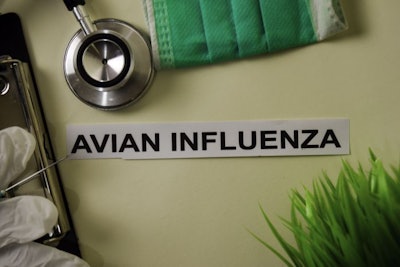
Just a few days after avian flu was declared resolved in poultry by the respective veterinary authorities of France and the U.K., the disease has already reappeared in Belgium, France and Luxembourg.
And this before the autumn/fall migration of wild birds — often suspected as the source of index infections in poultry — has even approached its peak.
First French cases identified in poultry trader
Within the past two weeks, it was reported that 2021-2021 HPAI outbreak series linked to the H5N8 virus variant in France had been closed.
Late last week, however, poultry belonging to a private owner tested positive for a virus belonging to the same HPAI virus family. According to the French agriculture ministry, the mixed poultry flock in the department of Ardennes was immediately euthanized.
As the affected premises is not part of the French commercial poultry sector, the ministry has stressed that the latest discovery does not affect the country’s status as “avian influenza-free.”
France raises risk level to 'moderate'
With this latest development, however, agriculture minister Julien Denormandie has raised the avian flu risk level in France from “low” to “moderate.” He has also called on hunters and poultry owners to adhere to strict biosecurity procedures, and to be alert for possible signs of the disease in domestic and wild species.
From September 10, a number of preventative measures have come into effect. These aim to prevent the spread of any infection to poultry from wetlands, where wild birds gather and mix, and other designated “risk areas.” Poultry in these areas must be kept housed or under netting, and their health monitored daily. Also in the designated zones, there is a ban on gatherings of birds for competitions, shows, and pigeon racing. In zoos, birds that cannot be confined or protected from wild species under netting must be vaccinated. Also banned is the movement of birds from the affected areas to any other part of France. And finally, any transportation or release of game birds will be limited, and require prior authorization.
Earlier this year, many of the stakeholders in the French poultry sector came together to develop a “roadmap” that would prevent another HPAI crisis in the country. The latest outbreak series just ended involved almost 500 outbreaks in 15 departments, and the culling of around 3.5 million birds. Worst affected were the duck and goose flocks in the south-west of the country.
Avian flu cases in Belgium, Luxembourg
Located in northeastern France, the department of Ardennes borders Belgium. It is named after the physical feature — the Ardennes plateau — which also extends across Belgium, Luxembourg, and into Germany.
Last week, veterinary authorities in Belgium officially registered the country’s second outbreak of avian flu of this season. Affected was a backyard flock near Chiny in the province of Luxemburg on the last day of August. According to the report to the World Organisation for Animal Health (OIE), five of the nine birds died, and the rest have been destroyed.
After an absence of less than two months, presence of the H5N8 HPAI virus had been confirmed in a mixed poultry flock at Menen in West Flanders on the previous day. The Chiny poultry keeper had recently purchased birds from the Menen market trader, reported Belgium’s Federal Agency for Safety of the Food Chain.
Following up on contacts with these infected Belgian flocks, poultry belonging to an amateur breeder in Olingen in the Grand Duchy of Luxembourg have tested positive for the same HPAI virus type. According to RTL, the birds were tested in early September because of links to the first outbreak in Belgium. The breeder had recently purchased poultry from a market in the neighboring state.
These findings prompted the veterinary authority in Luxembourg to repeat the regulation that transportation of poultry is only permitted between licensed premises. No such authorization was obtained in this case. As a result, the owner of the dead and culled poultry will receive no financial compensation, according to the state’s director of veterinary services. RTL reports that 45 of the 60 birds were euthanized.
For the next month at least, officials also advised owners to keep their birds housed, and to feed them instead. These measures will reduce attraction of wild birds.
Over this period, transportation of poultry should be minimized within Luxembourg, reported RTL. Furthermore, any unexplained illness or mortality in poultry must be reported and investigated.
No new cases in Lithuania, Sweden, U.K.
In May of this year, the animal health agency of Lithuania officially recorded a single outbreak of HPAI linked to the H5N8 virus variant. Affected were around 1,200 poultry belonging to a trader in the west of the country. As no further cases have been detected, and the authorities have declared to the OIE that the situation has been “resolved.”
Since the start of the HPAI season in 2020, Sweden’s veterinary authority has registered with the Organisation a number of cases in wild birds. These followed tests positive for the H5, H5N1, H5N4, H5N5 or H5N8 virus variants. None of these viruses has been detected in the country in recent weeks, according to the latest series of reports.
There have also been no further cases of HPAI or low-pathogenic avian influenza in the U.K., based on official reporting to the OIE.
In the past month, HPAI has been detected in six western and southern African states — Benin, Ghana, Ivory Coast, Nigeria, South Africa, and most recently in Botswana.
View our continuing coverage of the global avian influenza situation.

















